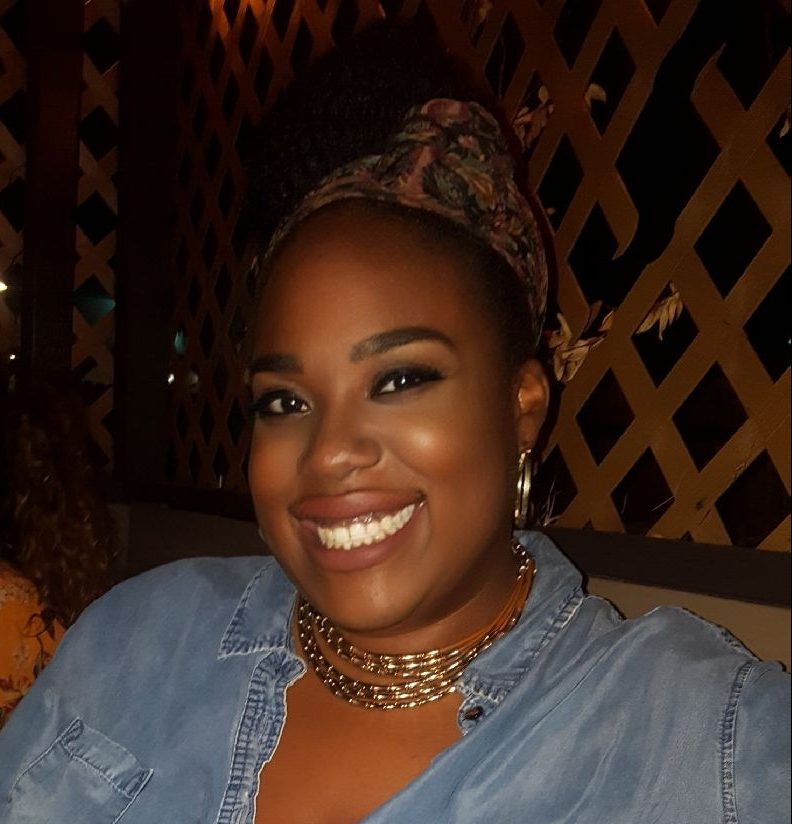Featured UCLA Feminist: Elizabeth Rogers

Elizabeth Rogers is the Campus Assault Resources and Education (CARE) coordinator of Preventative Education at UCLA. When asked if she considers herself a feminist, she responded with an enthusiastic, “Hell yeah!”
Elizabeth is a southern California native and military brat; personally, she would describe herself as being observant starting from a young age. Being “curious when it comes to how bodies move throughout the world”, Elizabeth found herself studying at a small liberal arts women’s college in Massachusetts. After transferring to the University of Alabama, Elizabeth sought many opportunities to mold her studies to center activism. As a queer, Black woman, Elizabeth created student organizations focused around some of her own intersecting identities while working towards a degree in political science and a minor in sociology.
Elizabeth obtained her master’s degree at the University of Alabama in gender and race studies and during the 2016 election taught African American studies and women’s studies in Alabama, which she notes as an experience with heavy implications given the period and location. After her graduation, she explained how her job search led her to “look for jobs to find a space where I could create other spaces for folks the institution blocks out.”
Elizabeth’s work at the CARE center is relevant and important to the University now more than ever. She is the prevention education coordinator in charge of all prevention efforts against campus sexual violence. She conducts trainings, presentations, outreach, programming, and community engagement. Elizabeth structures her programming not necessarily around sexual violence, but around more discussion-based experiences focusing on “identity, humanity, etc.” She asserts that the CARE office is rooted in feminist and queer theory, “which is a rare space to find in a working environment.” She ensures that these resources are inclusive to people who don’t readily have access to “an institution that doesn’t care about communities of color in those respects”. Her work is not about “claiming the label” of activist or feminist, despite the power in having that title. She acknowledges that at times, people don’t want to claim the label because it has been historically used against them.
When asked what feminism means to her, she took the time to emphasize that she identifies specifically as a Black feminist. Elizabeth’s version of feminism prioritizes intersectionality and takes into account the history of exclusion of the Black community within feminism. She also notes that true feminism should “provide space for people, provide choices for people.” There is an abundance of structural trauma, historical trauma, and structural inaccessibility that needs to be addressed. Once we overcome these issues, we can “create choices for folks to be empowered and to be liberated.” Elizabeth recognizes that some of these choices might go against the system, but they are necessary. She notes how “feminism is community and collaboration. We need to get to the roots of these issues by not just reading, but practicing these things because history is biased and research has been biased.”
As for the future of CARE, Elizabeth has a vision of a “fully robust program with even more advocates and further prevention education.” She wants to change the campus climate surrounding sexual violence, and keep the conversations around these issues open. Elizabeth explains, “it’s a lot when it’s just one person,” but she wants to reach all the communities and to spend enough time to build trust within those communities. Additionally, the inclusion of therapists whom persons can be referred to for specialized therapy would provide students with extended therapy rather than CAPS limited sessions. Lastly, Elizabeth hopes for a space in which programs can be offered, “where people can relax, come together, drink tea!”
Going forward, Elizabeth hopes that feminism can push policies and laws in “a more inclusive way that counteracts old historical treatments, because discourse has shown that feminism has influenced [and can continue to influence] laws.” Feminism should get back to what it is really about, the empowerment of not only women but all oppressed groups, because feminism looks different across different communities. Lastly, Elizabeth hopes that “the feminism word can be reclaimed, and its understanding be reclaimed, so that it is not just seen as white women burning a bra.”




